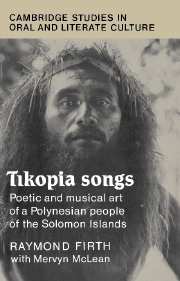Book contents
- Frontmatter
- Contents
- ILLUSTRATIONS
- FIGURES
- Preface
- Acknowledgements
- Sketch map of Tikopia (approx. 5 sq. km.)
- Part I General
- Part II Musical analysis (by Mervyn McLean)
- Part III Song texts, translations and commentary
- 6 Dance songs of everyday life
- 7 Songs of the sea and of travel
- 8 Eulogies and farewells
- 9 Songs of protest and criticism
- 10 Songs of erotic arousal and sex antagonism
- 11 Laments and funeral dirges
- 12 Songs on historical and mythic themes, and of ritual quality
- 13 Epilogue
- Appendix 1 Composers to whom songs attributed
- References
- Index
9 - Songs of protest and criticism
Published online by Cambridge University Press: 07 May 2010
- Frontmatter
- Contents
- ILLUSTRATIONS
- FIGURES
- Preface
- Acknowledgements
- Sketch map of Tikopia (approx. 5 sq. km.)
- Part I General
- Part II Musical analysis (by Mervyn McLean)
- Part III Song texts, translations and commentary
- 6 Dance songs of everyday life
- 7 Songs of the sea and of travel
- 8 Eulogies and farewells
- 9 Songs of protest and criticism
- 10 Songs of erotic arousal and sex antagonism
- 11 Laments and funeral dirges
- 12 Songs on historical and mythic themes, and of ritual quality
- 13 Epilogue
- Appendix 1 Composers to whom songs attributed
- References
- Index
Summary
Readers of my other works on Tikopia will be aware that Tikopia society, in its relatively traditional state or in its more modern shape, was not always in a condition of amity and smooth operation. Apart from long-standing clashes of interest, as between clans or districts, there were also turbulent incidents in which individuals took action, sometimes violently, to remedy a grievance or express a sense of outrage or frustration. Weapons might be brandished, house thatch beaten, and though physical injury to an opponent was not common, it was not unknown. The most usual form of expression of complaint or anger, however, was verbal, by cursing or other protest, often punctuated by the high-pitched yell of Iēfu!, which gave public notification of distress or indignation.
Notable among verbal forms of protest or assertion of dissent have been songs. Tikopia songs of complaint, protest or criticism form part of the general body of Tikopia song in that they conform in structure to the normal poetic and musical patterns. But they have been of special interest to the Tikopia in that they constitute a category known as tauangutu - jeering songs - or commonly mako tauangutu - jeering dance songs - since they nearly all have been composed to be accompaniments to dance. Tauangutu is a compound word, and may be loosely translated sectionally as ‘war of the lips’. Mako tauangutu have a great range of content. They may refer to laziness, lying, slander, theft, desertion and analogous breaches of the social code.
- Type
- Chapter
- Information
- Tikopia SongsPoetic and Musical Art of a Polynesian People of the Solomon Islands, pp. 190 - 204Publisher: Cambridge University PressPrint publication year: 1991



